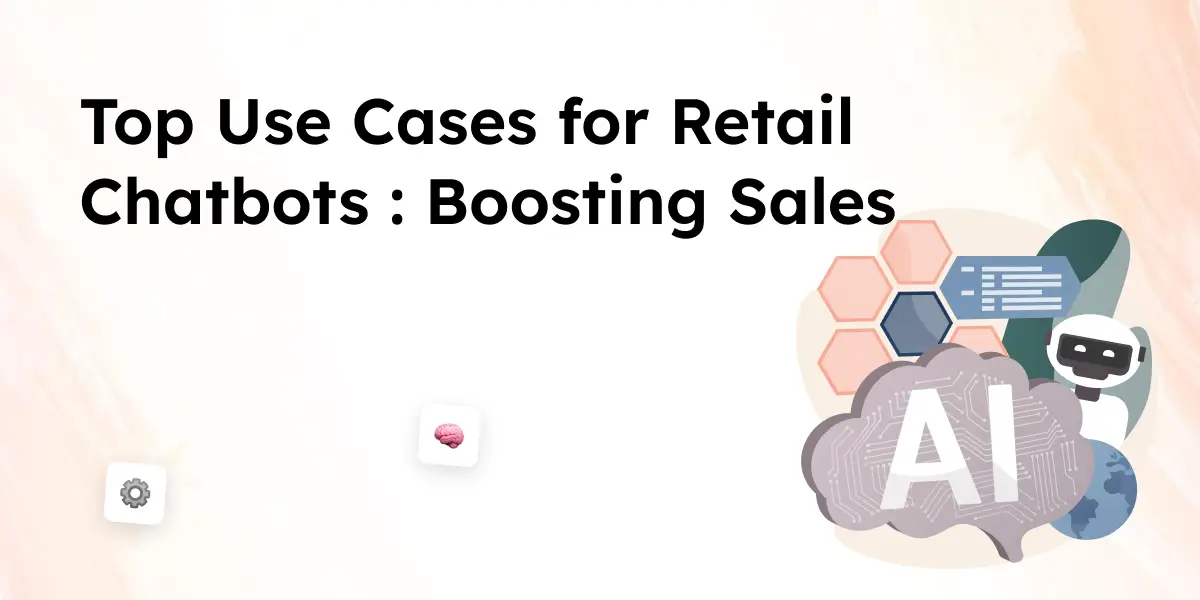Retail businesses use chatbots to improve customer service, streamline operations, and increase sales. These AI-powered virtual assistants handle customer inquiries, recommend products, and manage return policies, enhancing the overall shopping experience. With advancing AI capabilities, chatbots provide instant responses, optimize engagement, and personalize interactions. This guide covers chatbot use cases in retail, benefits for businesses, and best practices for implementation.
What is a Retail Chatbot?
A retail chatbot is an AI-powered tool that automates customer interactions, improves customer support, and enhances the shopping experience. These bots assist retailers by managing orders, answering inquiries, and offering personalized recommendations. They can be rule-based or powered by generative AI to provide more conversational and intelligent responses. Retail chatbots also help businesses streamline operations, optimize customer engagement, and drive sales through marketing and promotions.
Key Points:
- Retail chatbots automate customer interactions and improve customer support.
- They handle tasks like answering inquiries, managing orders, and providing product recommendations.
- AI chatbots can be rule-based or powered by generative AI for more conversational responses.
- Retailers use chatbots to optimize engagement, reduce response times, and streamline operations.
- Chatbots integrate with eCommerce platforms, CRM systems, and other retail solutions.
- They also support marketing efforts by collecting feedback and offering promotions.
Top Retail Chatbot Use Cases
Retail chatbots play a significant role in improving customer interactions and streamlining operations. From answering queries to offering personalized recommendations, chatbots in retail provide valuable support for both businesses and customers. Below are some of the most effective chatbot use cases in retail.
Enhancing Customer Service with AI-Powered Chatbots
Retailers use chatbots to provide immediate responses to customer inquiries, reducing wait times and improving customer satisfaction. AI chatbots can answer frequently asked questions, handle return policies, and resolve basic issues without needing a human agent. This allows customer support teams to focus on more complex concerns while ensuring that customers receive quick and accurate assistance.
Personalized Shopping and Product Recommendations
AI-powered chatbots analyze customer preferences, browsing history, and past purchases to offer personalized recommendations. These bots tailor product suggestions to individual needs, helping customers find items that match their interests. By providing a more customized shopping experience, chatbots can drive sales and improve customer engagement.
Order Management and Tracking with Chatbots
Retail bots simplify order tracking by giving real-time updates on shipping and delivery status. Customers can check order progress, receive notifications, and get assistance with modifications without having to contact customer service directly. This improves transparency and enhances the overall shopping journey.
Retail Chatbots for Marketing and Promotions
Retailers leverage chatbots to promote special offers, discounts, and new arrivals. AI chatbots can send notifications about ongoing sales, suggest relevant deals based on customer preferences, and assist with loyalty programs. This targeted approach helps retailers drive sales and improve customer retention.
Collecting Customer Feedback and Improving Retail Experience
Retail chatbot solutions enable businesses to gather customer feedback through quick surveys and automated responses. This data helps retailers optimize their products, services, and customer interactions. Conversational AI chatbots analyze responses to understand customer needs better, ensuring continuous improvements in service quality.
Benefits of Retail Chatbots
Retail chatbots offer a range of advantages for both businesses and customers. By automating customer interactions, chatbots streamline support, enhance engagement, and improve the overall retail experience. Below are some key benefits of using AI-powered chatbots in the retail sector.
24/7 Customer Support and Faster Response Times
Chatbots provide immediate assistance to customers at any time of day, reducing wait times and ensuring quick resolutions to inquiries. This allows retailers to handle high volumes of customer support requests without requiring additional human agents.
Cost Savings and Operational Efficiency
Retail businesses can reduce customer service costs by automating routine interactions. Chatbots can be integrated with eCommerce platforms, reducing the need for large support teams while improving service consistency.
Personalized Shopping Experience
AI-powered chatbots use customer data to tailor product recommendations and offer personalized promotions. This helps customers discover relevant products, enhances engagement, and drives sales.
Improved Customer Satisfaction and Loyalty
By offering quick and accurate responses, chatbots help improve customer experience and satisfaction. A seamless interaction leads to higher retention rates and a stronger connection between the retailer and the customer.
Scalability and Seamless Integration
Retail chatbots can manage thousands of interactions simultaneously, making them ideal for peak shopping seasons. They integrate with CRM, inventory, and payment systems to create a smooth shopping journey.
Best Practices for Implementing a Chatbot for Retail
To maximize the impact of a chatbot in retail, businesses need to follow best practices that ensure efficiency, accuracy, and seamless customer interactions. Below are key strategies retailers should consider when developing and deploying a chatbot.
Understanding Retailer Needs Before Implementing a Chatbot
Retailers should identify their main goals for using chatbots, whether it’s improving customer service, automating order tracking, or enhancing marketing efforts. Choosing the right chatbot platform and defining chatbot use cases in retail will ensure that the bot aligns with business objectives.
Optimizing Conversational AI for Customer Engagement
Retail chatbots not only enhance customer engagement but also serve as powerful tools for capturing potential customers and converting them into leads. By integrating lead generation features, retail chatbots can collect customer preferences, guide them through personalized product recommendations, and qualify leads for follow-ups. Learn how chatbots streamline lead generation.
Ensuring Seamless Integration with Retail Systems
A chatbot for retail should integrate with existing retail solutions such as CRM software, inventory management, and eCommerce platforms. This helps chatbots streamline operations and provide accurate information on product availability, orders, and return policies.
Maintaining and Updating AI Chatbots for Maximum Efficiency
Retail chatbots require ongoing improvements to stay relevant. Businesses should analyze chatbot interactions, update knowledge bases, and refine responses to optimize performance. Regular testing helps chatbots provide accurate and helpful information while maintaining customer satisfaction.
Future of Retail Chatbots and Generative AI
The retail industry is rapidly evolving, and AI-powered chatbots are playing a bigger role in shaping the future of customer interactions. With advancements in generative AI, retail bots are becoming more intelligent, adaptive, and capable of handling complex conversations. Here’s what the future holds for chatbots in retail.
More Human-Like Conversations with Generative AI
Generative AI chatbots are improving customer service by providing responses that feel more natural and personalized. These bots use AI technologies like natural language processing to understand customer queries and deliver relevant answers with minimal human intervention.
Advanced Personalization and Tailored Recommendations
AI chatbots can analyze customer preferences, past purchases, and browsing behavior to offer personalized recommendations. As AI capabilities improve, chatbots will play a key role in delivering highly customized shopping experiences that drive sales.
Integration with Omnichannel Retail Solutions
Retail bots may become more integrated across different customer touchpoints, including eCommerce websites, social media platforms, and in-store digital assistants. This will create a seamless shopping journey where customers receive consistent support regardless of how they interact with a retailer.
Automation of More Retail Operations
From managing inventory to optimizing supply chains, AI-powered chatbots will continue to streamline retail operations. Retailers can use AI chatbots to automate tasks beyond customer support, improving efficiency across multiple areas of the business.
AI-Powered Insights for Retailers
Chatbots can analyze customer interactions, providing valuable insights into shopping trends, customer behavior, and product performance. These AI-driven analytics will help retailers optimize their strategies, improve customer satisfaction, and enhance the overall retail experience.
Conclusion
Retail chatbots are essential tools for improving customer service, streamlining operations, and enhancing the shopping experience. AI-powered bots assist with customer inquiries, offer personalized recommendations, and automate order management. As generative AI advances, chatbots are becoming more conversational and efficient. Retailers integrating chatbots into their systems can optimize engagement, improve customer satisfaction, and increase sales while reducing operational costs.
FAQs About Retail Chatbots
1. What are retail chatbots used for?
Retail chatbots assist with customer inquiries, order tracking, product recommendations, and handling return policies. They also help retailers automate marketing and improve customer engagement.
2. How do chatbots improve customer service in retail?
Chatbots provide instant responses, reduce wait times, and handle repetitive tasks, allowing human agents to focus on complex customer needs. This leads to better customer satisfaction.
3. Can chatbots personalize the shopping experience?
Yes, AI-powered chatbots analyze browsing behavior and purchase history to offer personalized recommendations, promotions, and shopping assistance.
4. What are the benefits of using chatbots in retail?
Retailers benefit from cost savings, improved efficiency, increased sales, and enhanced customer interactions. Chatbots streamline support and optimize engagement across multiple channels.
5. How can retailers integrate chatbots into their businesses?
Retail chatbots can be integrated with eCommerce platforms, CRM systems, and inventory management tools. This allows them to provide real-time updates, automate customer support, and personalize interactions.



